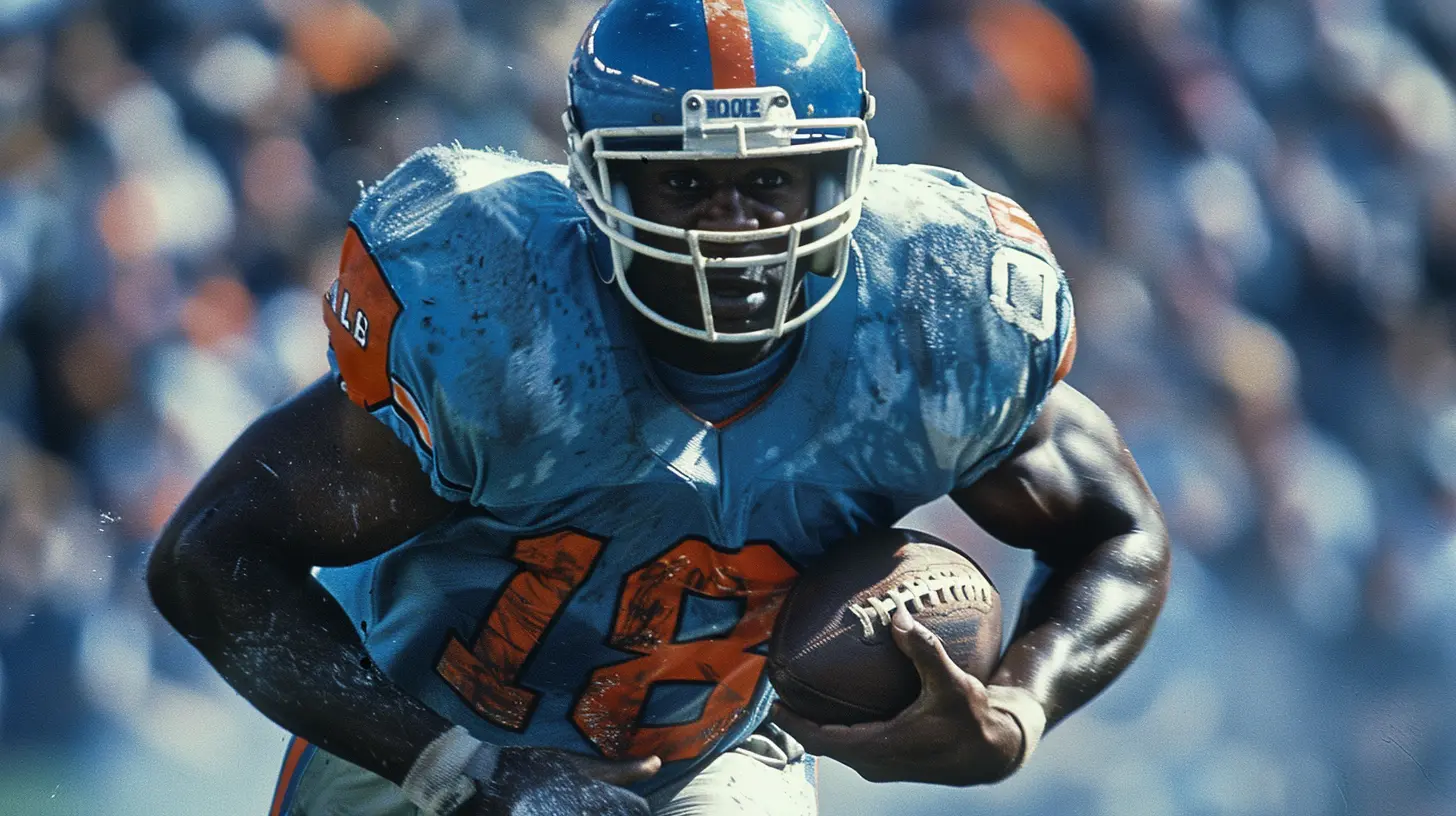Behind the Lens: The Power of Sports Documentaries
2 June 2025
There's something magical about the world of sports. It's not just the games, the players, or even the final score that captivates us. It's the stories. The blood, sweat, and tears that go into every victory and defeat. And there's no better way to experience these stories than through sports documentaries. Behind the lens of every great documentary is an untold story waiting to unfold, and the power of these films goes far beyond the field, court, or track.
From the rise of Michael Jordan in The Last Dance to the emotional rollercoaster of Free Solo, sports documentaries have a way of pulling us into the heart of the action. They show us what it truly means to be an athlete, to face challenges head-on, and to push beyond limits. But why are these documentaries so powerful? What makes them stand out in a world already saturated with sports content? Let's dive in and explore the magic behind the lens.

The Human Element: More Than Just the Game
At the core of every great sports documentary is the human story. Sure, we all love watching athletes perform at the highest level, but what really hooks us is the journey. It's the behind-the-scenes struggles, the personal challenges, and the emotional depth that make us care. We’re not just watching a game; we’re connecting with the people behind it.Take The Last Dance, for example. It's not just a documentary about Michael Jordan's dominance in the NBA. It's about his relentless drive, his battles with teammates, and his pursuit of perfection. Viewers get an intimate look into Jordan's psyche, his personal sacrifices, and what it took for him to become one of the greatest athletes of all time.
Sports documentaries succeed because they make athletes relatable. We may not be able to dunk like Jordan or run marathons like Eliud Kipchoge, but we can all relate to their struggles, their failures, and their triumphs. It’s this human element that allows sports documentaries to transcend the games themselves and become something much more meaningful.
The Power of Vulnerability
What makes these documentaries even more compelling is the vulnerability they show. Athletes, often seen as invincible, are revealed to be human after all. They have fears, doubts, and insecurities. They face personal demons, and sometimes, they fail spectacularly. But it's in these moments of vulnerability that we see their true strength.Take Free Solo, the documentary about Alex Honnold's attempt to climb El Capitan without any ropes. The film doesn't just focus on the physical challenge of climbing; it delves into Honnold's mental state, his fears, and his relationships. The audience isn't just holding their breath as he scales the mountain, they're also grappling with the emotional weight of his decisions. We see the cracks in his armor, and that makes his achievements even more awe-inspiring.
This vulnerability makes athletes real to us. They're no longer just names on a scoreboard; they're people with dreams, fears, and a relentless drive to succeed.

The Emotional Rollercoaster: Why We Keep Coming Back
Sports documentaries are a wild ride of emotions. One moment you're on the edge of your seat, heart pounding, adrenaline pumping. The next, you're wiping away tears or feeling the weight of disappointment. This emotional rollercoaster is what makes these films so addictive.Think of Senna, the documentary about the legendary Formula 1 driver Ayrton Senna. It's not just a film about cars racing around a track. It's about Senna's passion for driving, his rivalries, and ultimately, his tragic death. The film takes you through the highs of his incredible victories and the gut-wrenching lows of his fatal crash. It's an emotional journey that sticks with you long after the credits roll.
Sports documentaries tap into our deepest emotions—hope, fear, joy, sorrow. They remind us of the unpredictable nature of life, where anything can happen, and often does.
The Underdog Story
Who doesn’t love a good underdog story? It’s one of the most powerful tropes in sports, and documentaries are full of them. These stories resonate because, at some level, we’ve all felt like the underdog at some point in our lives. Watching someone overcome the odds, break barriers, and achieve greatness gives us hope that we can do the same.One of the best examples is Undefeated, which follows a high school football team in inner-city Memphis. The team has been struggling for years, but with a new coach and a renewed sense of purpose, they fight their way to an inspiring season. The film isn’t just about football; it’s about resilience, hope, and the power of belief.
The underdog story is the ultimate feel-good narrative, and when done right, it's impossible not to get swept up in the emotion of it all.

The Visual Storytelling: More Than Just Footage
While the stories themselves are gripping, the way they're told is just as important. Sports documentaries are masterclasses in visual storytelling. It's not just about showing game footage or interviews; it's about crafting a narrative that draws the viewer in.Filmmakers use a combination of slow-motion shots, close-ups, and dramatic music to build tension. They splice in archival footage, raw behind-the-scenes moments, and candid interviews to give us a fuller picture. Every frame is carefully crafted to evoke a specific emotion, whether it's excitement, suspense, or heartbreak.
In Icarus, the Oscar-winning documentary about doping in professional sports, director Bryan Fogel uses a personal narrative to reveal the dark underbelly of international sports. The film starts as a personal experiment but quickly turns into a global scandal. The use of hidden cameras, phone calls, and secret meetings adds a layer of intrigue and suspense, making it feel more like a thriller than a traditional documentary.
This kind of storytelling elevates sports documentaries from mere recaps of events to cinematic experiences that captivate and inspire.

Inspiring Change: The Power to Influence
Sports documentaries don’t just entertain; they have the power to inspire real-world change. By shining a light on important social, political, or cultural issues, these films can influence public opinion and spark conversations that lead to action.One of the most impactful examples is The Two Escobars, which explores the intersection of soccer and drug cartels in Colombia. The film delves into the lives of soccer star Andrés Escobar and drug lord Pablo Escobar, showing how deeply intertwined sports and politics were in Colombia during the 1990s. It sheds light on the dangers athletes face in politically charged environments and the far-reaching consequences of corruption. The film sparked conversations about the role of sports in society and the impact of crime and politics on athletes.
In a similar vein, Athlete A brought to light the systemic abuse within USA Gymnastics, focusing on the survivors of Larry Nassar's abuse. The documentary not only exposed the failures of the organization but also gave a voice to the survivors, contributing to broader conversations about abuse in sports and the importance of accountability.
These films have the potential to change the way we think about sports, athletes, and even society itself.
A Window Into Different Cultures
Sports documentaries also offer a unique window into different cultures and societies. Sports are a universal language, but how they're played, valued, and viewed varies from culture to culture. Through these films, we get to experience sports in ways we never could as spectators.For example, Rising Phoenix showcases the world of Paralympic athletes, giving viewers a glimpse into the challenges and triumphs of athletes with disabilities. The documentary not only sheds light on the Paralympic Games but also challenges preconceived notions about disability and athleticism. It's a powerful reminder that greatness comes in many forms.
Similarly, The Edge takes us into the world of cricket, a sport that might not be as popular in the U.S. but is a cultural phenomenon in countries like India, England, and Australia. The film dives deep into the psychological toll of professional cricket, giving us a rare look into the minds of these athletes.
These documentaries give us a broader perspective on the world of sports and help us appreciate the diversity of athletic experiences.
Conclusion: Why Sports Documentaries Matter
At the end of the day, sports documentaries are about more than just sports. They're about people—their dreams, struggles, triumphs, and failures. They give us a peek behind the curtain, showing us what it really takes to be great. They make us feel, think, and sometimes even cry. They inspire us to push our limits, to fight for what we believe in, and to never give up.But perhaps most importantly, sports documentaries remind us that, in life, just like in sports, the journey is just as important as the destination. Whether you're a die-hard sports fan or someone who barely knows the rules, these films have something to offer everyone. They tell stories that stay with you long after the final whistle has blown.
So, the next time you’re browsing for something to watch, consider diving into a sports documentary. You might just find yourself cheering for more than the final score.
all images in this post were generated using AI tools
Category:
Sports DocumentariesAuthor:

Easton Simmons
Discussion
rate this article
3 comments
Yolanda Campbell
Sports documentaries provide a unique lens, showcasing the passion and struggles of athletes, enriching fans' understanding of the sports they love.
June 20, 2025 at 11:04 AM

Easton Simmons
Thank you! I completely agree—sports documentaries not only highlight athletes' journeys but also deepen fans' connections to their favorite sports.
Makayla McKale
Sports documentaries ignite our passion and unveil untold stories, reminding us of the resilience, triumph, and spirit that define athletes and their unforgettable journeys. Unleash the inspiration!
June 5, 2025 at 12:46 PM

Easton Simmons
Absolutely! Sports documentaries truly capture the essence of athletes' journeys, showcasing their resilience and inspiring us all. Thank you for your insightful comment!
Arianth Montgomery
Sports documentaries offer a unique lens into the lives, struggles, and triumphs of athletes. They not only entertain but also educate, providing valuable insights into the human experience behind the games we love.
June 2, 2025 at 12:01 PM

Easton Simmons
Thank you! I completely agree—sports documentaries truly capture the depth and resilience of athletes, enriching our understanding of their journeys beyond the field.



